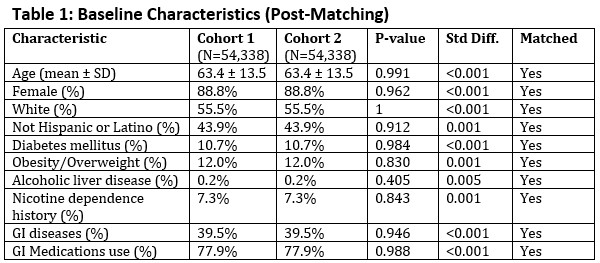Monday Poster Session
Category: Biliary/Pancreas
P2176 - Lower Incidence of Pancreatic Cancer in Patients on HER2-Targeted Therapy: Potential Implications in Pancreatic Cancer Prevention
Monday, October 27, 2025
10:30 AM - 4:00 PM PDT
Location: Exhibit Hall

Nurlan Aliyev, MD
University of Nebraska Medical Center
Elkhorn, NE
Presenting Author(s)
Nurlan Aliyev, MD1, Dilyaver Matakhov, MD2, Ahmad Nawaz, MBBS3, Yusuke Hashimoto, MD4, Aun R. Shah, MBBS, MRCP5, Fedja A. Rochling, MBBCh, MBA6, Ishfaq Bhat, MD7
1University of Nebraska Medical Center, Elkhorn, NE; 2INOVA Fairfax Hospital, Fairfax, VA; 3SUNY Upstate Medical University, Syracuse, NY; 4University of Florida College of Medicine, Jacksonville, FL; 5CHI Health Creighton University Medical Center, Omaha, NE; 6UNMC, Omaha, NE; 7University of Nebraska Medical Center, Omaha, NE
Introduction: Pancreatic cancer (PC) incidence and mortality have been rising steadily in the United States since 1995. Despite ongoing advances, no effective preventive agents exist. Human epidermal growth factor receptor 2 (HER2) positivity is reported in 2-15% of PCs and is linked to poorer prognosis. HER2-targeted agents improve outcomes in other HER2-positive cancers, including breast and gastric cancers. However, their preventive effect on PC has not been investigated. We aimed to assess the incidence of pancreatic cancer in patients receiving HER2-targeted therapies for non-pancreatic malignancies.
Methods: Data was obtained from the TriNetX Global Collaborative Network, including 143 healthcare organizations. Patients aged 18 to 90 years with diagnosis of breast, colon, rectal, biliary, endometrial, gastric, esophageal, salivary gland, oral cavity, bladder, ovarian cancer, and non-small cell carcinoma were included. Cohort 1 comprised patients who received HER2-targeted agents (trastuzumab, pertuzumab, margetuximab, neratinib, lapatinib, tucatinib, trastuzumab deruxtecan); Cohort 2 included patients with a cancer diagnosis but no exposure to HER2-targeted agents. Patients with prior PC were excluded. Propensity score matching (1:1) was performed based on demographics and comorbidities (diabetes mellitus, obesity, alcoholic liver disease, chronic pancreatitis, and nicotine dependence), and use of gastrointestinal medications (Table 1). The primary outcome was PC incidence after the index event across a 20-year observation window.
Results: After matching, 54,338 patients were included in each cohort. The incidence of PC was lower in the HER2-targeted group compared to the control group (276 vs. 329). Risk analysis showed a statistically significant lower risk in the HER2 cohort (Risk Difference -0.1%, p = 0.025; OR 0.833, 95% CI: 0.710–0.978). Kaplan-Meier analysis confirmed this finding, with a hazard ratio of 0.768 (95% CI: 0.654–0.901, p = 0.042). Patients in the HER2 group also had fewer instances of PC events (mean 9.4 vs. 17.2, p < 0.001) (Table 2).
Discussion: In a large, matched cohort analysis, HER2-targeted therapy was associated with a significantly lower incidence of PC in patients with non-pancreatic malignancies. These findings raised the possibility of a preventive effect, potentially through suppression of HER2-driven pathways in occult pancreatic lesions. Further studies are warranted to explore this hypothesis and define the role of HER2 inhibition in PC prevention.

Figure: Baseline characteristics

Figure: Study Outcomes
Disclosures:
Nurlan Aliyev indicated no relevant financial relationships.
Dilyaver Matakhov indicated no relevant financial relationships.
Ahmad Nawaz indicated no relevant financial relationships.
Yusuke Hashimoto indicated no relevant financial relationships.
Aun Shah indicated no relevant financial relationships.
Fedja Rochling indicated no relevant financial relationships.
Ishfaq Bhat indicated no relevant financial relationships.
Nurlan Aliyev, MD1, Dilyaver Matakhov, MD2, Ahmad Nawaz, MBBS3, Yusuke Hashimoto, MD4, Aun R. Shah, MBBS, MRCP5, Fedja A. Rochling, MBBCh, MBA6, Ishfaq Bhat, MD7. P2176 - Lower Incidence of Pancreatic Cancer in Patients on HER2-Targeted Therapy: Potential Implications in Pancreatic Cancer Prevention, ACG 2025 Annual Scientific Meeting Abstracts. Phoenix, AZ: American College of Gastroenterology.
1University of Nebraska Medical Center, Elkhorn, NE; 2INOVA Fairfax Hospital, Fairfax, VA; 3SUNY Upstate Medical University, Syracuse, NY; 4University of Florida College of Medicine, Jacksonville, FL; 5CHI Health Creighton University Medical Center, Omaha, NE; 6UNMC, Omaha, NE; 7University of Nebraska Medical Center, Omaha, NE
Introduction: Pancreatic cancer (PC) incidence and mortality have been rising steadily in the United States since 1995. Despite ongoing advances, no effective preventive agents exist. Human epidermal growth factor receptor 2 (HER2) positivity is reported in 2-15% of PCs and is linked to poorer prognosis. HER2-targeted agents improve outcomes in other HER2-positive cancers, including breast and gastric cancers. However, their preventive effect on PC has not been investigated. We aimed to assess the incidence of pancreatic cancer in patients receiving HER2-targeted therapies for non-pancreatic malignancies.
Methods: Data was obtained from the TriNetX Global Collaborative Network, including 143 healthcare organizations. Patients aged 18 to 90 years with diagnosis of breast, colon, rectal, biliary, endometrial, gastric, esophageal, salivary gland, oral cavity, bladder, ovarian cancer, and non-small cell carcinoma were included. Cohort 1 comprised patients who received HER2-targeted agents (trastuzumab, pertuzumab, margetuximab, neratinib, lapatinib, tucatinib, trastuzumab deruxtecan); Cohort 2 included patients with a cancer diagnosis but no exposure to HER2-targeted agents. Patients with prior PC were excluded. Propensity score matching (1:1) was performed based on demographics and comorbidities (diabetes mellitus, obesity, alcoholic liver disease, chronic pancreatitis, and nicotine dependence), and use of gastrointestinal medications (Table 1). The primary outcome was PC incidence after the index event across a 20-year observation window.
Results: After matching, 54,338 patients were included in each cohort. The incidence of PC was lower in the HER2-targeted group compared to the control group (276 vs. 329). Risk analysis showed a statistically significant lower risk in the HER2 cohort (Risk Difference -0.1%, p = 0.025; OR 0.833, 95% CI: 0.710–0.978). Kaplan-Meier analysis confirmed this finding, with a hazard ratio of 0.768 (95% CI: 0.654–0.901, p = 0.042). Patients in the HER2 group also had fewer instances of PC events (mean 9.4 vs. 17.2, p < 0.001) (Table 2).
Discussion: In a large, matched cohort analysis, HER2-targeted therapy was associated with a significantly lower incidence of PC in patients with non-pancreatic malignancies. These findings raised the possibility of a preventive effect, potentially through suppression of HER2-driven pathways in occult pancreatic lesions. Further studies are warranted to explore this hypothesis and define the role of HER2 inhibition in PC prevention.

Figure: Baseline characteristics

Figure: Study Outcomes
Disclosures:
Nurlan Aliyev indicated no relevant financial relationships.
Dilyaver Matakhov indicated no relevant financial relationships.
Ahmad Nawaz indicated no relevant financial relationships.
Yusuke Hashimoto indicated no relevant financial relationships.
Aun Shah indicated no relevant financial relationships.
Fedja Rochling indicated no relevant financial relationships.
Ishfaq Bhat indicated no relevant financial relationships.
Nurlan Aliyev, MD1, Dilyaver Matakhov, MD2, Ahmad Nawaz, MBBS3, Yusuke Hashimoto, MD4, Aun R. Shah, MBBS, MRCP5, Fedja A. Rochling, MBBCh, MBA6, Ishfaq Bhat, MD7. P2176 - Lower Incidence of Pancreatic Cancer in Patients on HER2-Targeted Therapy: Potential Implications in Pancreatic Cancer Prevention, ACG 2025 Annual Scientific Meeting Abstracts. Phoenix, AZ: American College of Gastroenterology.
